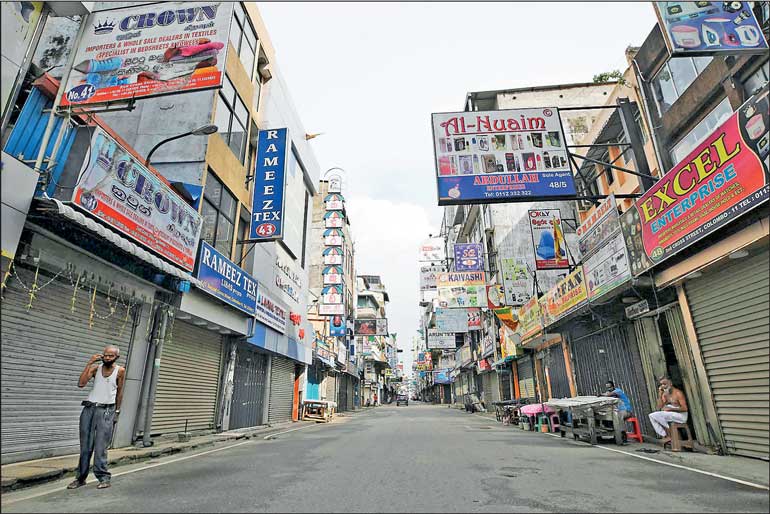Monday Feb 23, 2026
Monday Feb 23, 2026
Wednesday, 11 May 2022 00:07 - - {{hitsCtrl.values.hits}}

Of course, in such a situation, genuine businesses, who have been battered since pandemic-related lockdowns too will be delighted to see the emergence of such good Samaritans – Pic by Shehan Gunasekara
Although Sri Lanka’s unprecedented economic crisis experienced today had been accelerated by the pandemic, we should not ignore the other root causes such as excessive foreign borrowings from the market for living beyond means and endemic corruptions.
market for living beyond means and endemic corruptions.
However the incumbent government was compelled to drastically control the imports of daily essentials at the outset of the COVID-19 pandemic. Results of these short-term measures are now obvious with the paucity of many daily essentials and the adjustments of exchange rates causing unbearable price hikes. Under this situation, the government leadership has been compelled to seek short- and medium-term assistance from all likely sources, countries as well as international and regional institutions.
Attempts were made at the outset under the Gotabaya administration to avoid seeking assistance from the IMF (International Monitory Fund), as 17 such programs have failed to achieve the declared objectives but only resulted in further accumulation of foreign debts. Therefore then economic advisers were proposing an alternative policy for reducing the debt burden which would have resulted in foreign exchange generation and attraction of FDIs (Foreign Direct Investments). They wanted the Government to introduce steep cuts in imports as a short-term measure and to introduce far-reaching economic reforms including the restructuring of SOEs (State-owned enterprises).
It was estimated that $ 8-10 billion could have been generated provided those measures were implemented, simultaneously attracting much-needed FDIs. However the Government failed unfortunately to follow the structural and SOE reforms while pursuing drastic import controls. Instead, the Government suddenly decided to announce the suspension of the repayment of outstanding foreign debts. The crisis faced by the country was further aggravated as a result of this unprecedented and questionable failure.
It has also been reported that the letter of suspension was issued despite the indication from China of the immediate provision of $ 2.5 billion credit facilities to meet the emergency requirement. As clearly known by the authorities such steps were taken as advised by the new economic team.
The key issue being addressed in this article is the Government’s seeking the assistance of other friendly sources, such as India, China, and Japan to meet the import requirements of daily essentials including fuel, medicine, gas and food items. Now we see that some countries are offering credit lines under certain conditions which are yet to be made public. It was while China has reiterated their willingness to provide similar facilities to reduce the pain on the people that the Government has approached the abovementioned donors.
There is no doubt that everyone in the country including the political leadership will be pleased to utilise such offers. Of course, in such a situation, genuine businesses, who have been battered since pandemic-related lockdowns too will be delighted to see the emergence of such good Samaritans. Undoubtedly, foreign and local rent seekers and commission agents also see such emergency procurements as an opportunity to make deals and push through foreign-funded projects and programs hitherto unwelcomed by the Government.
During the early days of the Gotabaya administration several foreign debt creating projects were rejected by the Treasury based on thorough review of the respective professional committees. These rejected projects include Polonnaruwa Water Supply Project, LNG Power Generation Complex, LRT Project (Light Rail Transit), Thalpitigala Irrigation Scheme and Court Automation Project.
When Sri Lanka resorts to the option of seeking credit facilities from our friendly nations, business interests in those countries too tend to line up for profitable opportunities. What we all should significantly be aware of at this juncture is that there are no free lunches. Every credit line or swap arrangement from most, if not all friendly sources are tied to procurement, primarily from the donors. As the crisis deepens, the issue of many scarcities emerge creating longer queues and chaos.
Almost all the procurements are being compelled to be processed on ‘emergency basis.’ Their propriety and transparency tend to be unnoticeable since the leaders of both sides of Parliament do not take interest in raising concerns to that effect.
It is also reported that some of our friendly countries who are being approached for foreign exchange facilities, while showing their readiness to help ailing Sri Lanka, they influence the authorities at highest level to reconsider foreign debt creating as well as uneconomical projects being thrust upon Sri Lanka by business interests of those countries irrespective of the fact that they aggravate the burden of our foreign debts. Some of these projects were thoroughly reviewed and rejected at the early days of the Gotabaya administration because they will add to the continued bleeding of SOEs.
Lobbying for such projects cannot be exclusively attributed to the foreign donors but critical roles with regard to them are also being played by some local vulturous deal makers. In spite of the ailing Sri Lankan economy lying in the intensive care unit, these vultures are in their habitual and parasitic game of sucking blood and eating flesh.
There are points that are being given to strengthen the justification of the funding of some of these projects based on a relatively long repayment period. However the fact that the country will be further entangled in debt traps even beyond the lifetime of these rent-seekers cannot be overemphasised.
Those who are up in arms over the incompetence of incumbent rulers and mounting hue and cry on past embezzlements of various politicians should also be aware of the opaque elements operating with torpedoing ulterior motives.
(The writer is the Managing Director of Veemansa Initiative.)